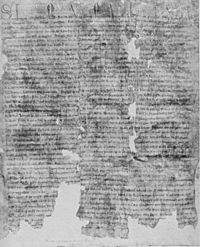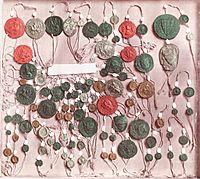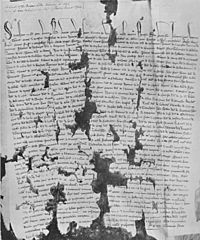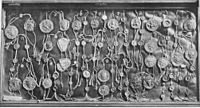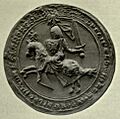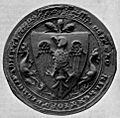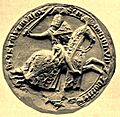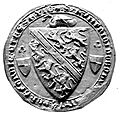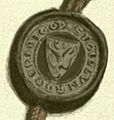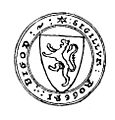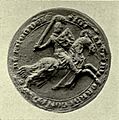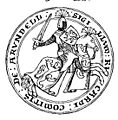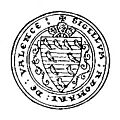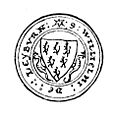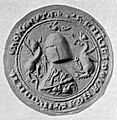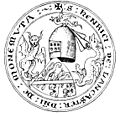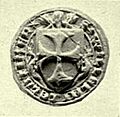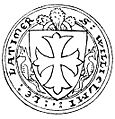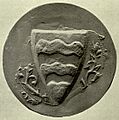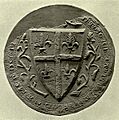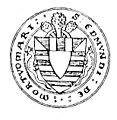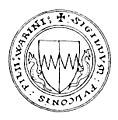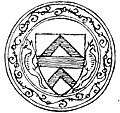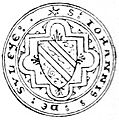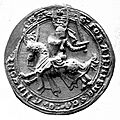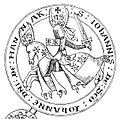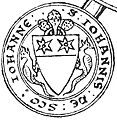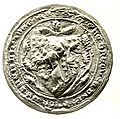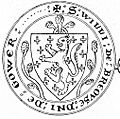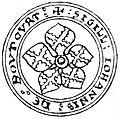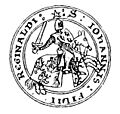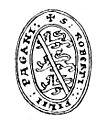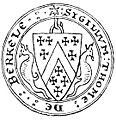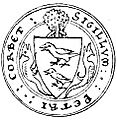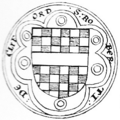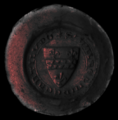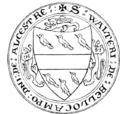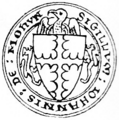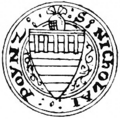Barons' Letter of 1301 facts for kids
The Barons' Letter of 1301 was a very important letter written by many powerful English nobles, including seven earls and 96 barons. They wrote it to Pope Boniface VIII to tell him they disagreed with his idea that he should be the boss of Scotland. The Pope had said this in a special message called a "papal bull" (a formal order from the Pope).
The barons wanted to defend the rights of King Edward I of England. They believed he was the true ruler of Scotland. Even though it was written, this letter was never actually sent to the Pope. Two copies of the letter still exist today, known as A and B. You can find them in the National Archives in Kew, England.
Contents
Why the Letter Was Written
The idea for this letter came during a big meeting of the Parliament of England in Lincoln. The letter was addressed to the Pope, calling him "most Holy Father." It was dated February 12, 1300, but because of how the calendar worked back then, this actually meant February 12, 1301.
The letter explained that King Edward I had shown them some letters from the Pope. These letters were about important matters concerning the kingdom. The English nobles felt strongly that the Pope was wrong to claim power over Scotland.
The Importance of Seals
The letter has many seals from the nobles who signed it. These seals are in great condition even today. They are very important because they show some of the earliest true coats of arms. Coats of arms are special designs that families or nobles use as their symbol. The rules for these designs, called heraldry, were only just being set up around the 1200s. So, these seals are a valuable look into early heraldry.
Many of these coats of arms also appear in other old records from that time. For example, some are in the Falkirk Roll of Arms from before the Battle of Falkirk in 1298. Others are in the stained glass windows of Dorchester Abbey in Oxfordshire.
What the Letter Aimed to Do
The main goal of the letter was to tell the Pope that the English barons completely rejected his claim to be the "feudal overlord" of Scotland. Being a feudal overlord meant having the highest authority and control over a land. The Pope had made this claim in a special order (a papal bull) in June 1299.
This papal bull was sent to King Edward I. It was delivered to him in Scotland in August 1300. The King then asked for advice on how to respond. This was a tricky time for the King. He had just won a difficult battle at the Siege of Caerlaverock Castle against the Scots.
The Scots had asked the Pope for help after they lost the Battle of Falkirk in 1298. But the English had fought hard to control Scotland and didn't want to let go. They worried Scotland might rebel again if they did.
French Influence
It seems that the French were actually behind the Pope's claim. France and Scotland were allies at the time, through an agreement called the Auld Alliance. They were both against England. If the Pope was the feudal overlord of Scotland, it would be very difficult for England to attack Scotland. This was because attacking a land under the Pope's control would have serious political and religious consequences.
So, the English had no intention of accepting the Pope's claim. The barons' letter showed their anger and open defiance. It was not polite or diplomatic like the Pope's message had been.
Why It Was Never Sent
In the end, the Barons' Letter was never sent to the Pope. Things changed quickly, and it seemed like the letter was no longer needed. However, King Edward I did send his own letter to the Pope with a similar message. That letter is now kept in the Vatican Archives. The two copies of the Barons' Letter were stored away and rediscovered centuries later.
Images for kids
See also
- Declaration of Arbroath, a declaration of Scottish independence, made in 1320. It is in the form of a letter submitted to Pope John XXII, dated 6 April 1320, intended to confirm Scotland's status as an independent, sovereign state
- Scimus Fili
Text
See the full text on wikisource s:Barons' Letter, 1301 (English); la:s:Baronum epistola, 1301 (Latin).
 | Leon Lynch |
 | Milton P. Webster |
 | Ferdinand Smith |


